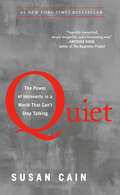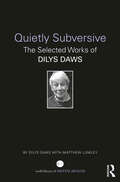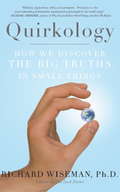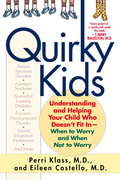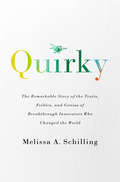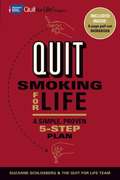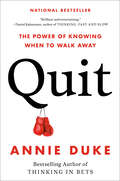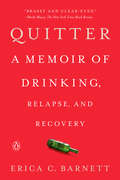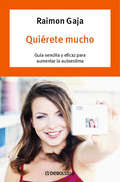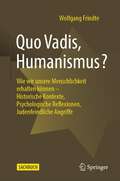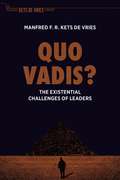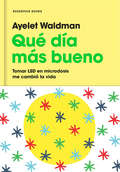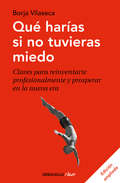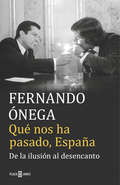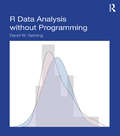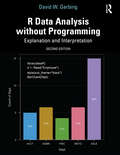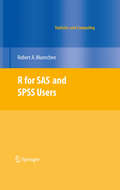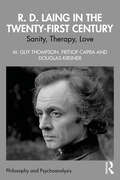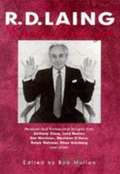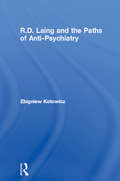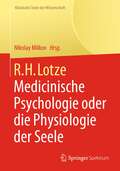- Table View
- List View
Quiet: El poder de los introvertidos / Quiet: The Power of Introverts in a World That Can't Stop Talking
by Susan CainBESTSELLER #1 DEL NEW YORK TIMES • El libro que inició un movimiento y revolucionó la forma en que el mundo ve a los introvertidos, y cómo los introvertidos se ven a sí mismos, al ofrecer validación, inclusión e inspiración. UNO DE LOS MEJORES LIBROS DEL AÑO según People, O: The Oprah Magazine, Christian Science Monitor, Inc., Library Journal, Kirkus Reviews Quiet es un libro que rompe paradigmas y demuestra la manera dramática en la que nuestra cultura ha malentendido y subestimado a los introvertidos. Además provee las herramientas con las cuales aprovechar sus fortalezas. Al menos un tercio de tus conocidos son introvertidos. Aquellos que prefieren escuchar a hablar; leer a salir de fiesta; aquellos que prefieren trabajar solos a formar parte de un equipo. Muchas veces descritos como “callados”, es a los introvertidos (Rosa Parks, Chopin o Dr. Seuss, por ejemplo) a quienes debemos muchas contribuciones a nuestra sociedad, desde los girasoles de Van Gogh, hasta la invención de la computadora personal. Apasionadamente escrito, investigado y repleto de historias de gente real, Quiet cambiará para siempre la manera en la que vemos a los introvertidos, y mejor aún, como ellos se ven a sí mismos. Susan Cain analiza el alza del Ideal Extrovertido durante el siglo XX y explora la manera profunda en que ha llegado a permear nuestra cultura. A través de investigación en la biología y psicología del temperamento, este libro provee diferentes ejercicios que nos benefician a todos, incluyendo ejemplos de cómo socializar si odias hablar de trivialidades, como modular tu personalidad dependiendo de las circunstancias, y como empoderar a los niños introvertidos.
Quiet: The Power of Introverts in a World That Can't Stop Talking (Platinum Nonfiction Ser.)
by Susan CainThe book that started the Quiet RevolutionAt least one-third of the people we know are introverts. They are the ones who prefer listening to speaking; who innovate and create but dislike self-promotion; who favor working on their own over working in teams. It is to introverts—Rosa Parks, Chopin, Dr. Seuss, Steve Wozniak—that we owe many of the great contributions to society. In Quiet, Susan Cain argues that we dramatically undervalue introverts and shows how much we lose in doing so. She charts the rise of the Extrovert Ideal throughout the twentieth century and explores how deeply it has come to permeate our culture. She also introduces us to successful introverts—from a witty, high-octane public speaker who recharges in solitude after his talks, to a record-breaking salesman who quietly taps into the power of questions. Passionately argued, superbly researched, and filled with indelible stories of real people, Quiet has the power to permanently change how we see introverts and, equally important, how they see themselves.Now with Extra Libris material, including a reader’s guide and bonus content
Quietly Subversive: The Selected Works of Dilys Daws (World Library of Mental Health)
by Dilys Daws Matthew LumleyThis book gathers together selected papers and book chapters by Dilys Daws, covering her 50 years of pioneering work as a child psychotherapist. It provides those working with parents, infants, and children with a means of learning from Daws’s decades of experience as a psychotherapist and therapeutic consultant, with plentiful case material illustrating her method of working in action. The first two sections of the book focus on her work as consultant psychotherapist in the baby clinic of a GP practice and her parent-infant work in this context as well as at the Tavistock and Portman Clinic. The third section explores her work with young children, focusing on questions around the therapeutic frame and setting. The fourth section features extended excerpts from her writings for the general public, most particularly aimed at new parents and parents with infants. Finally, the book also contains several short reflective pieces addressing themes to do with parent-infant work, the experience of the therapist, and the social role of psychoanalytic thinking. This book will be of interest to all those working with parents and children, including doctors, health visitors, and social workers, as well as child psychotherapists and child psychoanalysts.
Quirkology: How We Discover the Big Truths in Small Things
by Richard WisemanFor over twenty years, psychologist Richard Wiseman has examined the quirky science of everyday life. In Quirkology, he navigates the oddities of human behavior, explaining the tell-tale signs that give away a liar, the secret science behind speed-dating and personal ads, and what a person’s sense of humor reveals about the innermost workings of his or her mind--all along paying tribute to others who have carried out similarly weird and wonderful work. Wiseman’s research has involved secretly observing people as they go about their daily business, conducting unusual experiments in art exhibitions and music concerts, and even staging fake séances in allegedly haunted buildings. With thousands of research subjects from all over the world, including enamored couples, unwitting pedestrians, and guileless dinner guests, Wiseman presents a fun, clever, and unexpected picture of the human mind.
Quirky Kids
by Perri Klass Eileen CostelloThe toddler whose tantrums scare all the other kids on the playground . . . The three-year-old who ignores all his toys but seems passionately attached to the vacuum cleaner . . . The fourth-grade girl who never gets invited to a birthday party because classmates think she’s “weird” . . . The geek who is terrific at math, but is failing every other subject. Quirky children are different from other kids in ways that they–and their parents and teachers–have a hard time understanding or explaining. Straddling the line between eccentric and developmentally impaired, quirky children present challenges that standard parenting books fail to address. Now, inQuirky Kids, nationally known writer/pediatrician Perri Klass and her colleague Eileen Costello, a seasoned pediatrician with a special interest in child development, finally provide the expert guidance and in-depth research that families with quirky children so desperately need. A generation ago, such children were called odd ducks or worse. But nowadays, they are often assigned medical, psychiatric, or neurological diagnoses. The diagnoses often overlap or shift, but the labels can be frightening. Klass and Costello illuminate the confusing list of terms applied to quirky children these days–nonverbal learning disability, sensory integration disorder, obsessive-compulsive behavior, autistic spectrum disorder, pervasive developmental disorder, Asperger’s syndrome–and explain how to assess what exactly each diagnosis means and how to use it to help a child most effectively. Quirky Kidstakes you through the stages of a child’s life, helping to smooth the way at home, at school, even on the playground. How do you make it through mealtime, when emotions often erupt? How do you help the child’s siblings understand what’s going on? Is it better to “mainstream” the child or seek a special education program? How can you make a school more welcoming and flexible for a quirky child? How do you help your child deal with social exclusion, name-calling, and bullying? Choosing the right therapy for quirky children is especially difficult, because their problems fall outside traditional medical categories. Coping strategies might include martial arts or horseback riding, or speech and occupational therapies. Klass and Costello cover all the options, as well as offer a thorough consideration of the available medications, how they work, and whether medication is the best choice for your child. Drs. Klass and Costello firmly believe that the ideal way to help our quirky kids is to understand and embrace the qualities that make them exceptionally interesting and lovable. Written with upbeat clarity and informed insight, their book is a comprehensive guide to loving, living with, and enjoying these wonderful if challenging children.
Quirky Kids
by Perri Klass Eileen CostelloThe toddler whose tantrums scare all the other kids on the playground . . . The three-year-old who ignores all his toys but seems passionately attached to the vacuum cleaner . . . The fourth-grade girl who never gets invited to a birthday party because classmates think she's "weird" . . . The geek who is terrific at math, but is failing every other subject. Quirky children are different from other kids in ways that they-and their parents and teachers-have a hard time understanding or explaining. Straddling the line between eccentric and developmentally impaired, quirky children present challenges that standard parenting books fail to address. Now, in Quirky Kids, nationally known writer/pediatrician Perri Klass and her colleague Eileen Costello, a seasoned pediatrician with a special interest in child development, finally provide the expert guidance and in-depth research that families with quirky children so desperately need.A generation ago, such children were called odd ducks or worse. But nowadays, they are often assigned medical, psychiatric, or neurological diagnoses. The diagnoses often overlap or shift, but the labels can be frightening. Klass and Costello illuminate the confusing list of terms applied to quirky children these days-nonverbal learning disability, sensory integration disorder, obsessive-compulsive behavior, autistic spectrum disorder, pervasive developmental disorder, Asperger's syndrome-and explain how to assess what exactly each diagnosis means and how to use it to help a child most effectively. Quirky Kids takes you through the stages of a child's life, helping to smooth the way at home, at school, even on the playground. How do you make it through mealtime, when emotions often erupt? How do you help the child's siblings understand what's going on? Is it better to "mainstream" the child or seek a special education program? How can you make a school more welcoming and flexible for a quirky child? How do you help your child deal with social exclusion, name-calling, and bullying? Choosing the right therapy for quirky children is especially difficult, because their problems fall outside traditional medical categories. Coping strategies might include martial arts or horseback riding, or speech and occupational therapies. Klass and Costello cover all the options, as well as offer a thorough consideration of the available medications, how they work, and whether medication is the best choice for your child. Drs. Klass and Costello firmly believe that the ideal way to help our quirky kids is to understand and embrace the qualities that make them exceptionally interesting and lovable. Written with upbeat clarity and informed insight, their book is a comprehensive guide to loving, living with, and enjoying these wonderful if challenging children.From the Hardcover edition.
Quirky Kids: Understanding and Helping Your Child Who Doesn't Fit In- When to Worry and When Not to Worry
by Perri Klass Eileen CostelloThe toddler whose tantrums scare all the other kids on the playground . . . The three-year-old who ignores all his toys but seems passionately attached to the vacuum cleaner . . . The fourth-grade girl who never gets invited to a birthday party because classmates think she’s “weird” . . . The geek who is terrific at math, but is failing every other subject. Quirky children are different from other kids in ways that they–and their parents and teachers–have a hard time understanding or explaining. Straddling the line between eccentric and developmentally impaired, quirky children present challenges that standard parenting books fail to address. Now, in Quirky Kids, nationally known writer/pediatrician Perri Klass and her colleague Eileen Costello, a seasoned pediatrician with a special interest in child development, finally provide the expert guidance and in-depth research that families with quirky children so desperately need.A generation ago, such children were called odd ducks or worse. But nowadays, they are often assigned medical, psychiatric, or neurological diagnoses. The diagnoses often overlap or shift, but the labels can be frightening. Klass and Costello illuminate the confusing list of terms applied to quirky children these days–nonverbal learning disability, sensory integration disorder, obsessive-compulsive behavior, autistic spectrum disorder, pervasive developmental disorder, Asperger’s syndrome–and explain how to assess what exactly each diagnosis means and how to use it to help a child most effectively. Quirky Kids takes you through the stages of a child’s life, helping to smooth the way at home, at school, even on the playground. How do you make it through mealtime, when emotions often erupt? How do you help the child’s siblings understand what’s going on? Is it better to “mainstream” the child or seek a special education program? How can you make a school more welcoming and flexible for a quirky child? How do you help your child deal with social exclusion, name-calling, and bullying? Choosing the right therapy for quirky children is especially difficult, because their problems fall outside traditional medical categories. Coping strategies might include martial arts or horseback riding, or speech and occupational therapies. Klass and Costello cover all the options, as well as offer a thorough consideration of the available medications, how they work, and whether medication is the best choice for your child. Drs. Klass and Costello firmly believe that the ideal way to help our quirky kids is to understand and embrace the qualities that make them exceptionally interesting and lovable. Written with upbeat clarity and informed insight, their book is a comprehensive guide to loving, living with, and enjoying these wonderful if challenging children.From the Hardcover edition.
Quirky: The Remarkable Story of the Traits, Foibles, and Genius of Breakthrough Innovators Who Changed the World
by Melissa A SchillingThe science behind the traits and quirks that drive creative geniuses to make spectacular breakthroughsWhat really distinguishes the people who literally change the world--those creative geniuses who give us one breakthrough after another? What differentiates Marie Curie or Elon Musk from the merely creative, the many one-hit wonders among us?Melissa Schilling, one of the world's leading experts on innovation, invites us into the lives of eight people--Albert Einstein, Benjamin Franklin, Elon Musk, Dean Kamen, Nikola Tesla, Marie Curie, Thomas Edison, and Steve Jobs--to identify the traits and experiences that drove them to make spectacular breakthroughs, over and over again. While all innovators possess incredible intellect, intellect alone, she shows, does not create a breakthrough innovator. It was their personal, social, and emotional quirkiness that enabled true genius to break through--not just once but again and again.Nearly all of the innovators, for example, exhibited high levels of social detachment that enabled them to break with norms, an almost maniacal faith in their ability to overcome obstacles, and a passionate idealism that pushed them to work with intensity even in the face of criticism or failure. While these individual traits would be unlikely to work in isolation--being unconventional without having high levels of confidence, effort, and goal directedness might, for example, result in rebellious behavior that does not lead to meaningful outcomes--together they can fuel both the ability and drive to pursue what others deem impossible. Schilling shares the science behind the convergence of traits that increases the likelihood of success. And, as Schilling also reveals, there is much to learn about nurturing breakthrough innovation in our own lives--in, for example, the way we run organizations, manage people, and even how we raise our children.
Quit Smoking for Life: A Simple, Proven 5-Step Plan
by Suzanne SchlosbergBased on the techniques used in the nation's leading evidence-based tobacco cessation program, Quit Smoking for Life leads readers through a simple, proven method to quit smoking and remain tobacco-free for life.<P><P> It's full of engaging real stories from ex-smokers and experienced quitting coaches and includes a pull-out quitting plan and workbook.
Quit: The Power of Knowing When to Walk Away
by Annie DukeFrom the bestselling author of Thinking in Bets comes a toolkit for mastering the skill of quitting to achieve greater successBusiness leaders, with millions of dollars down the drain, struggle to abandon a new app or product that just isn&’t working. Governments, caught in a hopeless conflict, believe that the next tactic will finally be the one that wins the war. And in our own lives, we persist in relationships or careers that no longer serve us. Why? According to Annie Duke, in the face of tough decisions, we&’re terrible quitters. And that is significantly holding us back.In Quit, Duke teaches you how to get good at quitting. Drawing on stories from elite athletes like Mount Everest climbers, founders of leading companies like Stewart Butterfield, the CEO of Slack, and top entertainers like Dave Chappelle, Duke explains why quitting is integral to success, as well as strategies for determining when to hold em, and when to fold em, that will save you time, energy, and money. You&’ll learn:How the paradox of quitting influences decision making: If you quit on time, you will feel you quit earlyWhat forces work against good quitting behavior, such as escalation commitment, desire for certainty, and status quo biasHow to think in expected value in order to make better decisions, as well as other best practices, such as increasing flexibility in goal-setting, establishing &“quitting contracts,&” anticipating optionality, and conducting premortems and backcastsWhether you&’re facing a make-or-break business decision or life-altering personal choice, mastering the skill of quitting will help you make the best next move.
Quitter: A Memoir of Drinking, Relapse, and Recovery
by Erica C. Barnett"Emotionally devastating and self-aware, this cautionary tale about substance abuse is a worthy heir to Cat Marnell's How to Murder Your Life." --Publishers Weekly (starred review)A startlingly frank memoir of one woman's struggles with alcoholism and recovery, with essential new insights into addiction and treatmentErica C. Barnett had her first sip of alcohol when she was thirteen, and she quickly developed a taste for drinking to oblivion with her friends. In her late twenties, her addiction became inescapable. Volatile relationships, blackouts, and unsuccessful stints in detox defined her life, with the vodka bottles she hid throughout her apartment and offices acting as both her tormentors and closest friends.By the time she was in her late thirties, Erica Barnett had run the gauntlet of alcoholism. She had recovered and relapsed time and again, but after each new program or detox center would find herself far from rehabilitated. "Rock bottom," Barnett writes, "is a lie." It is always possible, she learned, to go lower than your lowest point. She found that the terms other alcoholics used to describe the trajectory of their addiction--"rock bottom" and "moment of clarity"--and the mottos touted by Alcoholics Anonymous, such as "let go and let God" and "you're only as sick as your secrets"--didn't correspond to her experience and could actually be detrimental.With remarkably brave and vulnerable writing, Barnett expands on her personal story to confront the dire state of addiction in America, the rise of alcoholism in American women in the last century, and the lack of rehabilitation options available to addicts. At a time when opioid addiction is a national epidemic and one in twelve Americans suffers from alcohol abuse disorder, Quitter is essential reading for our age and an ultimately hopeful story of Barnett's own hard-fought path to sobriety.
Quiérete mucho
by Raimon GajaA menudo mantenemos actitudes negativas y generamos pensamientos llenos de desespero que nos desmotivan, nos impiden alcanzar nuestros objetivos y nos hacen sentir desgraciados o culpables. Una baja autoestima impide llevar una vida psicológicamente saludable. Partiendo de la premisa que entender la causa de este problema es el punto de partida para empezar a solucionarlo, Quiérete mucho nos muestra caminos alternativos que nos ayudan a cambiar este patrón negativo y desprendernos de los obstáculos que nos impiden desarrollar todo nuestro potencial. Raimon Gaja trata el tema de la autoestima con el rigor y la importancia que se merece, sin reducirla aun simple aspecto secundario. A través de varios cuestionarios, Quiérete mucho nos da claves para evaluar nuestro nivel de autoestima y saber qué tipo de pensamiento distorsionado tenemos. Estos cuestionarios se repiten para ir comprobando nuestras evoluciones.
Quo Vadis, Humanismus?: Wie wir unsere Menschlichkeit erhalten können - Historische Kontexte, Psychologische Reflexionen, Judenfeindliche Angriffe
by Wolfgang FrindteWie steht es mit den humanistischen Grundlagen unseres Lebens und Zusammenlebens? Müssen wir uns nicht gerade heute dieser Fundamente versichern? Wer greift diese Fundamente an? Um diese Fragen beantworten zu können, nutzt der Autor ein Konstruktionsprinzip, mit dem die humanistischen Anstrengungen seit Petrarca in dreifacher Weise gerahmt werden: Zum einen werden diese Anstrengungen in die jeweiligen historischen Kontexte eingeordnet; zum zweiten greift er auf Reflexionen zurück, die sich in den verschiedenen Entwicklungsetappen der Psychologie explizit oder implizit auf den Humanismus beziehen; drittens schließlich macht er auf judenfeindliche und antisemitische Äußerungen, Vorurteile, Diskriminierungen und Vernichtungsexzesse aufmerksam, um die Ambivalenzen der verschiedenen humanistischen Anstrengungen zu verdeutlichen. Denn, so der Autor, die Einstellung und das Verhalten gegenüber Jüdinnen und Juden sind der Lackmustest eines jeglichen Humanismus.
Quo Vadis?: The Existential Challenges of Leaders (The Palgrave Kets de Vries Library)
by Manfred F. Kets de VriesWritten at a time of global pandemic, when we have been forced to confront age-old existential questions—Why are we here? Where are we going?—perhaps for the first time, Quo Vadis? is extraordinarily relevant to leaders, managers and anyone who wants to bring meaning and authenticity into their work and life. Manfred Kets de Vries argues that we need to address these fundamental and disturbing questions if we are to live fully and meaningfully. Too many people wake up on a Monday morning and do the same things they have done every Monday. They go to work and function on autopilot without questioning their purpose. But how can we make sure our lives are rich and fulfilling? How do we know we’re on the right track? This is a book about death and the fear of death, about angst and absurdity; but it is also about endurance, honesty, well-being, responsibility, living with hard truths, creating meaning—and happiness. Quo Vadis? makes us look full on at the things we prefer not to see. It is a short book that pulls no punches but is far from bleak. Instead, Kets de Vries shows that our life is enriched, and our ability to make meaning and find happiness is increased, when we acknowledge the inevitable price we have to pay for knowing our own mind and understanding our inevitable end.
Quranic Concepts in Islamic Psychology and Spirituality: Application in the Modern World (Islamic Psychology and Psychotherapy)
by Zuleyha KeskinThis book explores how the Qur’ân’s timeless teachings enrich contemporary psychological theories, bridging the gap between Islāmic wisdom and psychological well-being.It offers a comprehensive guide to understanding and applying Qur’ânic concepts in the realm of mental health. Grounded in Islāmic scholarship, it references both classical and modern Islāmic sources to explain fundamental Qur’ânic concepts in Islāmic psychology. The book is structured around three key areas: first, an Islāmic perspective on human faculties, essential for self-knowledge and self-awareness; second, the five pillars of Islam, which play a central role in psychological resilience; and third, various Qur’ânic spiritual concepts linked to mental well-being, such as ṣabr (patience), shukr (gratitude), riḍā (contentment) and iṭmi’nān (peacefulness).By integrating Islāmic principles with contemporary psychological insights and promoting a holistic approach to well-being, this book serves as a vital resource for personal development, academic study, and professional practice, particularly for mental health professionals working with Muslim clients.
Qué día más bueno: Tomar LSD en microdosis me cambió la vida
by Ayelet WaldmanUn mes en la vida de una mujer, escritora, esposa y madre de cuatro hijos que busca la estabilidad depositando sobre su lengua dos gotas de LSD. «Dos días después abrí el buzón y encontré un paquete. En el remite decía "Lewis Carroll". Dentro encontré un frasquito de color azul cobalto.» Hasta entonces, Ayelet Waldman había probado todas las terapias imaginables, de la farmacopea al mindfulness. Pero las tempestades anímicas que le provocaba su trastorno bipolar eran insoportables; marido e hijos sufrían con ella. Dos gotas del frasquito en la lengua y Ayelet se suma a la legión subterránea de ciudadanos que hacen un uso terapéutico del LSD en microdosis. Durante un mes, esta abogada, escritora y madre de adolescentes, lleva un diario sobre el tratamiento. En él también explora la historia y los mitos que rodean al LSD y otras drogas, así como la lucha bizantina que el Estado les antepone. El resultado es un testimonio revelador, tan alegre como fascinante. Críticas:«El libro más divertido que he leído últimamente.»Zadie Smith «Una mirada curiosa y exhaustiva a las posibilidades terapéuticas de las drogas ilegales. Un libro fascinante y profusamente documentado.»Nora Krug, The Washington Post «Un manifiesto lúcido y coherente sobre cómo y por qué la empresa racista e inmoral de la Guerra contra las drogas ha fracasado. Una obra apasionante y persuasiva.»Claire Vaye Watkins, The New Republic «Podría decirse que este libro es la particular guerra de Ayelet Waldman contra la propaganda que subyace a la Guerra contra las drogas, pero es también mucho más que eso y, sobre todo, mucho más divertido.»Rebeca Solnit «Un libro sincero, valiente y muy humano. Normalizando la discusión sobre el LSD, Waldman puede que un día ayude a otros a sentirse normales.»Jennifer Senior, The New York Times
Qué harías si no tuvieras miedo: Claves para reinventarte profesionalmente y prosperar en la nueva era
by Borja VilasecaEs hora de vencer los miedos que nos impiden seguir a nuestro corazón, y emprender una función profesional útil, creativa y con sentido. Si quieres conocer el mercado laboral que se avecina, léete este libro. Si quieres sobrevivir y prosperar en la nueva era, ponlo en práctica. El mundo para el que fuimos educados está dejando de existir. Las reglas del juego económico han cambiado. Somos una generación de transición entre dos eras: la industrial/analógica y la del conocimiento/digital. De ahí que no nos quede más remedio que reinventarnos, cuestionando las viejas creencias y consignas con las que fuimos condicionados. En caso de no hacerlo, pronto quedaremos obsoletos y nos quedaremos fuera del mercado. Lo más difícil consiste en vencer el miedo al cambio. Irónicamente, evitar el riesgo y permanecer en nuestra zona de comodidad es lo más arriesgado quepodemos hacer. Ha llegado la hora de saltar al vacío y emprender la travesía por el desierto, descubriendo de qué manera podemos desarrollar una profesión útil, creativa y con sentido que aporte mucho valor añadido. Solo así lograremos gozar de ingresos económicos abundantes y recurrentes en esta nueva era. «Quién quiere encontrará un medio; quién no, una excusa.» PROVERBIO ÁRABE
Qué nos ha pasado, España
by Fernando ÓnegaTras el éxito de Puedo prometer y prometo y Juan Carlos I, el hombre que pudo reinar, centrados en dos de las figuras emblemáticas que impulsaron la Transición, Fernando Ónega regresa con una biografía política, personal y sentimental de la sociedad española que hizo posible la llegada de la democracia. Franco presumía de haber dejado todo «atado y bien atado» para que su régimen tuviera continuidad más allá de su figura. Sin embargo, en los meses que siguieron a su muerte, los españoles fuimos desatando sin prisa pero sin pausa esos nudos que nos ligaban con el pasado hasta liberarnos del rígido corsé que habíamos llevado durante más de cuarenta años. Un proceso lleno de tensión que contó con un primer gran hito celebrado el 15 de junio de 1977, el día en que acudimos a las urnas por primera vez desde 1936 para elegir a nuestros representantes en las Cortes. Cuando se cumplen cuarenta años de aquellas elecciones y la generación nacida en democracia ha puesto en cuestión la obra de la Transición casi al completo, Fernando Ónega se enfrenta al reto de analizar y comprender cómo la sociedad española ha evolucionado desde la ilusión al desencanto en un periodo de tiempo tan corto. Con una inteligencia y sensibilidad que huye de los lugares comunes, nos ofrece una mirada al pasado desde un presente incierto en busca de respuestas para el futuro de este país. Los lectores han dicho...«Con la agilidad que le da esa especie de caballo que va unido a su verbo, el periodista gallego que le dio metáforas a Suárez explica las noches del arquitecto de la democracia. Lea este libro. Es de periodistas. Y es un gran libro de un gran periodista.»El País «Un original y certero ejercicio que culmina en un libro bien construido que nos invita a parar del ritmo frenético en el que vivimos, mirar hacia nuestro pasado más reciente, compararlo con el presente, reflexionar, analizar y aprender de los errores y los aciertos cometidos para afrontar de forma más eficiente el futuro.»Blog Me gustan los libros
R Data Analysis without Programming
by David W. GerbingThis book prepares readers to analyze data and interpret statistical results using R more quickly than other texts. R is a challenging program to learn because code must be created to get started. To alleviate that challenge, Professor Gerbing developed lessR. LessR extensions remove the need to program. By introducing R through less R, readers learn how to organize data for analysis, read the data into R, and produce output without performing numerous functions and programming exercises first. With lessR, readers can select the necessary procedure and change the relevant variables without programming. The text reviews basic statistical procedures with the lessR enhancements added to the standard R environment. Through the use of lessR, R becomes immediately accessible to the novice user and easier to use for the experienced user. Highlights of the book include: Quick Starts that introduce readers to the concepts and commands reviewed in the chapters. Margin notes that highlight,define,illustrate,and cross-reference the key concepts.When readers encounter a term previously discussed, the margin notes identify the page number to the initial introduction. Scenarios that highlight the use of a specific analysis followed by the corresponding R/lessR input and an interpretation of the resulting output. Numerous examples of output from psychology, business, education, and other social sciences, that demonstrate how to interpret results. Two data sets provided on the website and analyzed multiple times in the book, provide continuity throughout. End of chapter worked problems help readers test their understanding of the concepts. A website at www.lessRstats.com that features the lessR program, the book’s data sets referenced in standard text and SPSS formats so readers can practice using R/lessR by working through the text examples and worked problems, PDF slides for each chapter, solutions to the book’s worked problems, links to R/lessR videos to help readers better understand the program, and more. An ideal supplement for graduate or advanced undergraduate courses in statistics, research methods, or any course in which R is used, taught in departments of psychology, business, education, and other social and health sciences, this book is also appreciated by researchers interested in using R for their data analysis. Prerequisites include basic statistical knowledge. Knowledge of R is not assumed.
R Data Analysis without Programming: Explanation and Interpretation
by David W. GerbingThe new edition of this innovative book, R Data Analysis without Programming, prepares the readers to quickly analyze data and interpret statistical results using R. Professor Gerbing has developed lessR, a ground-breaking method in alleviating the challenges of R programming. The lessR extends R, removing the need for programming. This edition expands upon the first edition’s introduction to R through lessR, which enables the readers to learn how to organize data for analysis, read the data into R, and generate output without performing numerous functions and programming exercises first. With lessR, readers can select the necessary procedure and change the relevant variables with simple function calls. The text reviews and explains basic statistical procedures with the lessR enhancements added to the standard R environment. Using lessR, data analysis with R becomes immediately accessible to the novice user and easier to use for the experienced user. Highlights along with content new to this edition include: Explanation and Interpretation of all data analysis techniques; much more than a computer manual, this book shows the reader how to explain and interpret the results. Introduces the concepts and commands reviewed in each chapter. Clear, relaxed writing style more effectively communicates the underlying concepts than more stilted academic writing. Extensive margin notes highlight, define, illustrate, and cross-reference the key concepts. When readers encounter a term previously discussed, the margin notes identify the page number for the initial introduction. Scenarios that highlight the use of a specific analysis followed by the corresponding R/lessR input, output, and an interpretation of the results. Numerous examples of output from psychology, business, education, and other social sciences, that demonstrate the analysis and how to interpret results. Two data sets are analyzed multiple times in the book, provide continuity throughout. Comprehensive: A wide range of data analysis techniques are presented throughout the book. Integration with machine learning as regression analysis is presented from both the traditional perspective and from the modern machine learning perspective. End of chapter problems help readers test their understanding of the concepts. A website at www.lessRstats.com that features the data sets referenced in both standard text and SPSS formats so readers can practice using R/lessR by working through the text examples and worked problems, R/lessR videos to help readers better understand the program, and more. This book is ideal for graduate and undergraduate courses in statistics beyond the introductory course, research methods, and/or any data analysis course, taught in departments of psychology, business, education, and other social and health sciences; this book is also appreciated by researchers doing data analysis. Prerequisites include basic statistical knowledge, though the concepts are explained from the beginning in the book. Previous knowledge of R is not assumed.
R for SAS and SPSS Users
by Robert A. MuenchenThis book introduces R using SAS and SPSS terms. It demonstrates which of the add-on packages are most like SAS and SPSS and compares them to R's built-in functions. It compares and contrasts the differing approaches of all three packages.
R. D. Laing in the Twenty-First Century: Sanity, Therapy, Love (Philosophy and Psychoanalysis)
by Fritjof Capra M. Guy Thompson Douglas KirsnerIn this remarkable review of the seminal contribution of the Scottish psychiatrist and psychoanalyst, R. D. Laing, the three authors, each intimately acquainted with the subject matter, explore Laing’s intellectual and clinical legacy.Written from the perspective of a psychoanalyst, a scientist, and a philosopher, this unique book thoroughly addresses the three principal themes that defined Laing’s work: his views about sanity and madness, the use of therapy with those suffering from psychotic disturbance, and the vicissitudes of love relationships. They also explore authenticity, altered states, and healing. The authors bring a broad range of viewpoints in assessing Laing’s seminal contribution to contemporary thought, from both a scholarly and personal assessment rooted in each of their diverse relationships with him, both professional and personal.This volume will be of interest to those in the worlds of psychoanalysis, philosophy, science, and anyone with an interest in the work of R. D. Laing.
R. D. Laing: Creative Destroyer
by Bob MullanThis volume collects together accounts, both professional and personal, of R. D. Laing by those who knew him. Some view Laing as important as Jung or Freud - a revolutionary of his time. His psychiatry work in the 1960s and 1970s was unconventional, even radical, and Laing the man evoked a strong response from those who came into contact with him. The book features conversations, letters, photographs and poetry. Contributors include Allen Ginsberg, Anthony Clare, Ralph Metzner and Van Morrison.
R.D. Laing and the Paths of Anti-Psychiatry (Makers of Modern Psychotherapy)
by Zbigniew KotowiczIn the 1960s and 1970s, the radical and visionary ideas of R. D. Laing revolutionized thinking about psychiatric practice and the meaning of madness. His work, from The Divided Self to Knots, and his therapeutic community at Kingsley Hall, made him a household name. But after little more than a decade he faded from prominence as quickly as he had attained it. R.D.Laing and the Paths of Anti-Psychiatry re-examines Laing's work in the context of the anti-psychiatry movement. Concentrating on his most productive decade, the author provides a reasoned critique of Laing's theoretical writings, investigates the influences on his thinking such as phenomenology, existentialism and American family interaction research, and considers the experimental Kingsley Hall therapeutic community in comparison with anti-psychiatry experiments in Germany and Italy. The book provides a much needed reassessment and re-evaluation of Laing's work and its significance for psychotherapy and psychiatry today.
R.H. Lotze: Medicinische Psychologie oder die Physiologie der Seele (Klassische Texte der Wissenschaft)
by Nikolay MilkovOriginaltext mit philosophischen sowie historischen Kommentaren von Nikolay Milkov Als habilitierter Mediziner und Philosoph hat Rudolph Hermann Lotze durch seinen interdisziplinären Ansatz die Entwicklung der Psychologie im 19. Jahrhundert wie kein anderer geprägt. Im Unterschied zu anderen Wissenschaftlern der Zeit hat Lotze die neue Disziplin konsequent in enger Verbindung mit der Philosophie betrachtet, wie besonders in Medicinische Psychologie oder Physiologie der Seele (1852) deutlich wird. Dies bedeutete seine bewusste Abkehr von der Herangehensweise, die Psychologie ganz über experimentelle Untersuchungen und damit die Empirie zu definieren. Lotze scheute sich jedoch, diese entstehende Disziplin „philosophische Psychologie“ zu nennen, für ihn war sie nur physiologische Psychologie, herausgearbeitet mit Hilfe der Philosophie: Sie stellt Tatsachen fest und untersucht, wie Körper und Seele sich zueinander verhalten, tut dies jedoch nicht nur empirisch, sondern auch „metaphysisch“. In diesem Band wird Lotzes Originaltext untersucht, kommentiert und eingebettet in den soziokulturellen Hintergrund der Entstehungszeit, um einen tiefen, aber verständlichen Einblick in diesen Bereich der Psychologie zu geben.

